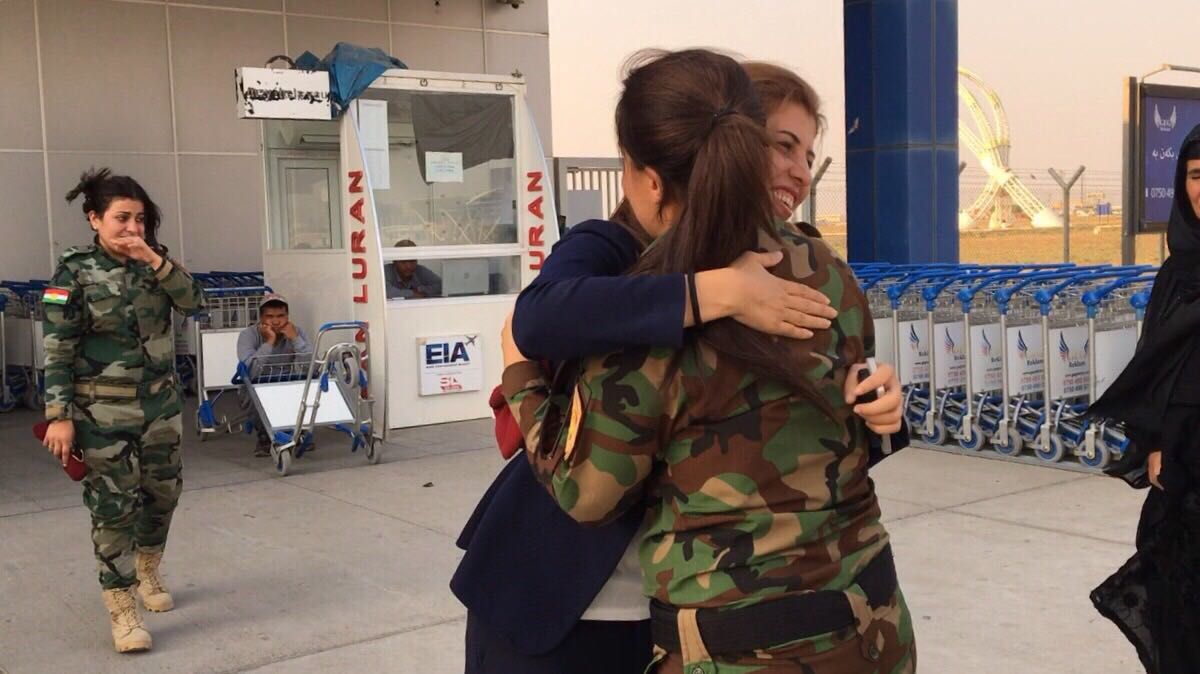Arriving in Doha, with less than 40 minutes to catch a flight into Iraqi Kurdistan, I was unable to get any information about connecting flights from the Qatar Airways flight attendants. FlightAware had not posted a gate number. The seat-back monitors, which had once promised to provide gate information before landing, had failed to do so. By now the plane had taxied, leaving only 35 minutes to board the next flight.
No one rushed for the door when finally the gangways rolled out to the airplane and the doors opened. Only some of us were headed to Erbil, the capital of the Kurdish region in northern Iraq. The rest felt no need to rush.
Beyond the gangway, at the top of the escalators leading into the terminal, a ground attendant held a sign for "Erbil." She called out to passengers arriving on the flight from John F. Kennedy International Airport in New York. By then, about half the party had already embarked toward the gate in one of those carts that honk and wail and scoot through the terminal at five miles per hour. Among those of us who remained was Lieutenant Kochar Saleh Haji of the peshmerga, the Kurdish military.
Rumors had spread that the borders would close ahead of the referendum. The Iraq Civil Aviation Authority oversees flights to and from Erbil, and serves as one of Baghdad’s points of leverage over the semi-autonomous Kurdish region. Some believed this flight would be the last to make it through.
Concerned about making her connection, Lt. Haji told me in a mix of Kurdish, Arabic, and English that she felt excited about the upcoming independence referendum, a vote which would gauge the Kurdish desire to separate from Iraq’s central government in Baghdad. She was also excited about returning home to Dohuk.
As the ground crew whisked passengers toward security and their connection, Lt. Haji reflected on her journey. She'd been in New York to accept the UNESCO Global Hope Coalition award, given to 10 “everyday heroes.” Lt. Haji dedicated the award to the nearly 1,800 peshmerga fighters who had died alongside an international coalition in the fight against the Islamic State.
“I would also like to encourage the international community to respect and recognize the will and the voice of the people of the Kurdistan Region,” Lt. Haji said at the award ceremony in Manhattan. She made no mention of her own frontline war record: She had served with the peshmerga for eight years.
She was affable, sharp and relaxed, with the eyes of a fighter and a warm countenance.
Writing in 1870, Major Frederick Milligan, then a Fellow of the Royal Geographical Society, revered Kurdish women for their dignity and strong stature within the tribal unit. This reverence was displayed by men within the tribes, especially among elders.
Lieutenant-Colonel Edward Noel of Britain echoed this sentiment while on special assignment in Kurdistan in 1918. Noel, who at the time held the rank of major, described in his journal an encounter with a Kurdish tribal elder. Noel suggested that on a break from their hike they might gather for a photo.
“Would you like [to include] the women as well?” the elder asked.
“Of course,” Noel said, “if there is no objection.”
“Objection,” the elder said, “what objection could there be?”
More than a century later, as a harried group of travelers tried to catch the flight to Erbil, Lt. Haji acted as a kind of shepherd for us all. She guided the weary travelers ahead of her. As the frantic airline employee dipped and dodged through airport security lines, leaving the rest of us behind, Lt. Haji made sure everyone else passed security before she herself stepped through.
Eventually, she scrambled onto the plane with just enough time to snap one last selfie.
After the three-hour flight to Erbil, Lt. Haji went to the baggage carousel to retrieve her luggage and found herself surrounded by friends.
Several yards away, a man rode a scissor lift into the air overhead to adjust a massive Kurdish flag hanging in the terminal. Lt. Haji stood beneath it and smiled. She was home. And independence, she said, was going to happen.
